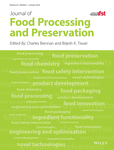Using chromatography and mass spectrometry to monitor isomerization of catechin in alkaline aqueous with thermal processing
Funding information: Ministry of Science and Technology, Taiwan, Grant/Award Number: MOST 103-2113-M-130-001 (to L.-Y. Chen)
Abstract
Polyphenols are associated with a wide range of physiological properties. Catechins are a class of polyphenolic flavonoids predominantly found in foods and beverages that are chemically unstable. This study investigated the effects of thermal processing and pH on the structural changes to catechins and examined how these effects impact the antioxidant capacity of these molecules. The results indicated the total phenolic contents of catechin were increased after alkalifying and thermal processing. The catechin is modified by thermal processing in an alkaline environment. The chromatographic analysis demonstrated that basification and thermal processing reduced catechin, resulting in cleavage of the heterocyclic ring of the flavan-3-ols via oxidation cleavage of the ether bond. A novel reaction intermediate for this transformation is proposed.
Practical applications
Heating process and pH adjustment are used to meet hygienic requirements and maintain flavor during tea infusion processing in tea beverage manufacturing. Catechins account for the largest sum of polyphenols found in green tea. Basification and heating could catalyze the isomerization of catechin through an opened heterocyclic ring pathway. Catechin remains stable in acidic solutions during thermal processing, thus, avoiding changes of quality.




